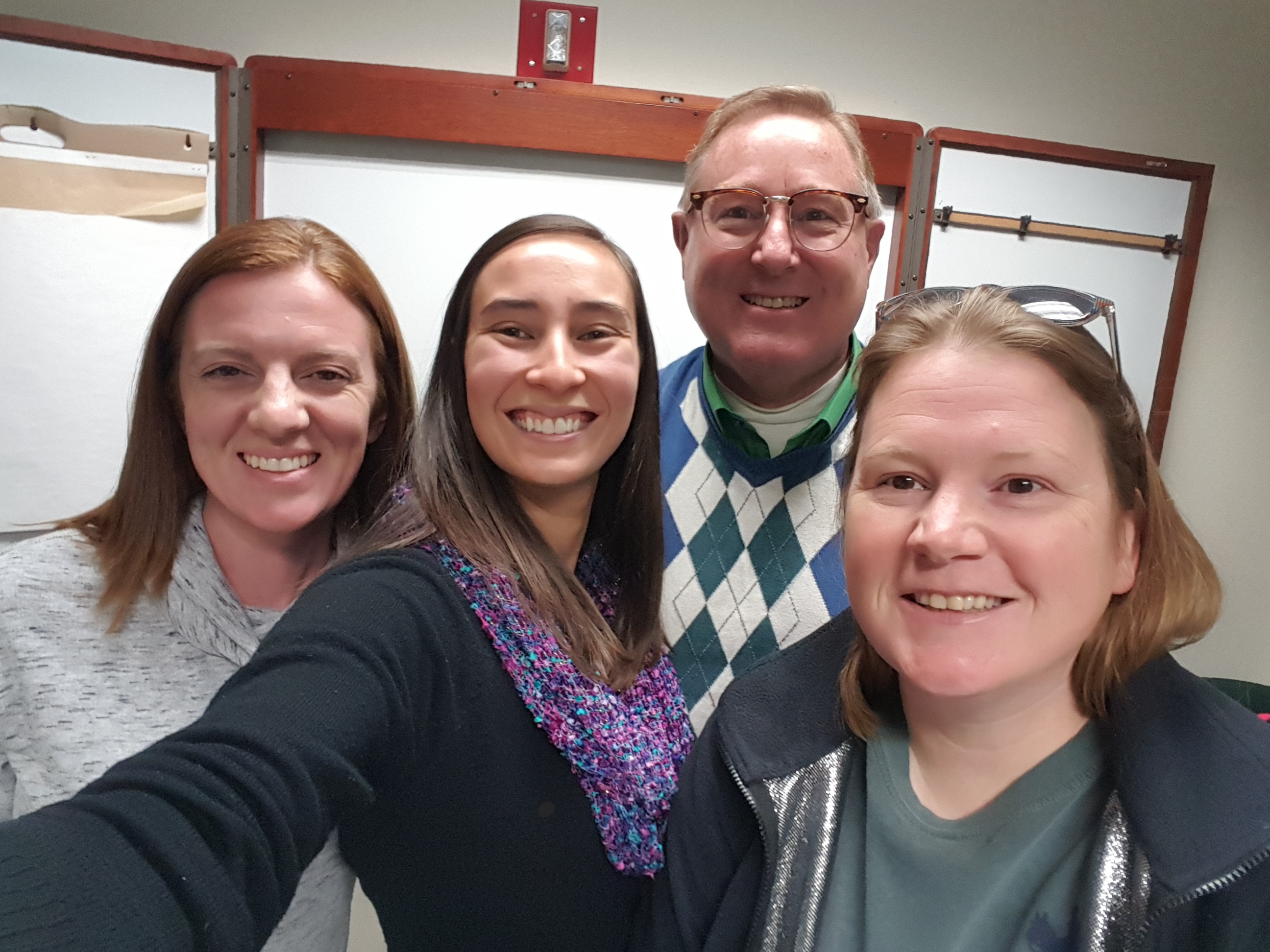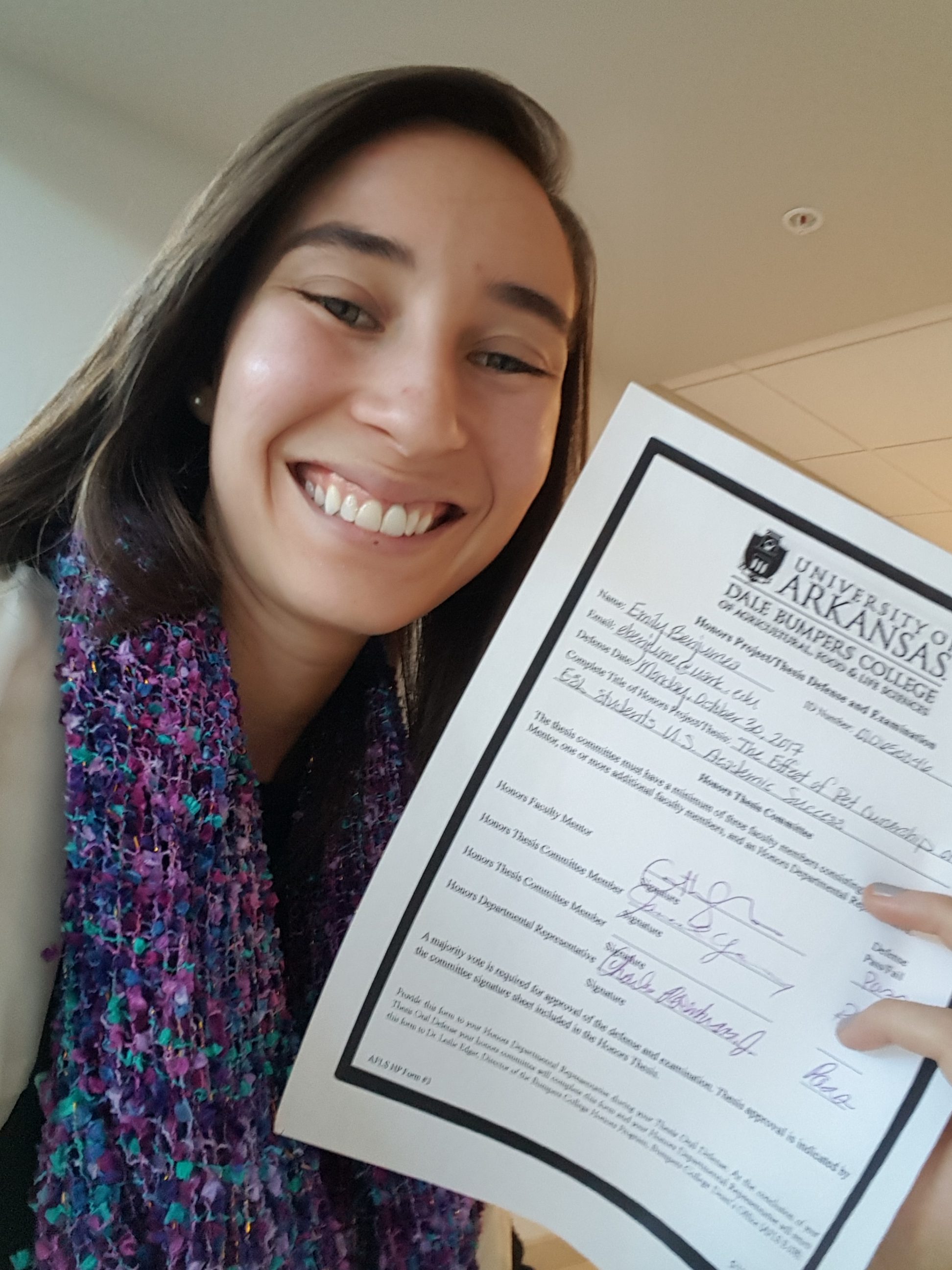
Emily Benjumea takes a defense selfie with her thesis committee: Drs. Kate Shoulders, Charles Rosenkrans and Janeal Yancy, all from the Dale Bumpers College of Agricultural, Food & Life Sciences
Recent honors graduate Emily Benjumea is a planner. She started her honors thesis three semesters in advance, but due to several necessary readjustments in her research she still wound up scrambling to the finish line. It turned out all right in the end, but her story serves as a healthy reminder: start early! No matter how prepared you are, you could still face some unexpected setbacks. Emily sat down with us to talk about the importance of recalibration in her thesis project, which studied the ways in which English as a Second Language students perceive their pets as helping them adjust to various aspects of their lives at school.
HC: Your project went through several different iterations before you found one that stuck. Can you walk us through the evolution of your thesis?
Emily: I have a degree in animal science, and I plan to get a master’s in education, so I wanted to do a project that would bridge these two interests. It took a lot of time for me and my mentor to figure out all of the things that weren’t going to work; I started three semesters before graduation, but I ended up doing my research in the same semester as I defended. My original idea was to have young students read to a dog and see if they read more fluently (that is, with more accuracy, more speed and more calmness) to the dog than to an adult. But there were a lot of kinks with this one:
- The students had to have a waiver signed by their parents
- Dogs aren’t allowed in a lot of buildings on campus
- How to transport the dog to campus
- Deciding what breed of dog to use
So we moved on from that idea to focusing on adult ESL students, since we have so many at the university. But we had trouble coordinating our schedules with busy students on campus.
So we moved on again, this time to a survey: how does having pets in your life at home help you with the emotional, social and academic aspects of school? I still focused on ESL students, but instead of staying on campus I went to three middle schools in Fayetteville. Even though these students were young enough to need a signed waiver, this project was simpler because the pet part was out of my hands – it depended on whether or not they had a pet at home. And that was my final project, tying together animal science, education and my Spanish minor.
HC: What information were you able to glean from your surveys?
Emily: Two of the survey questions asked about the emotional aspects of school life, two asked about social aspects, and the rest were about academics. There weren’t as many positive responses to the academic questions, but there were a lot in the social, so in general students perceive a positive influence there. I’m not sure that at that age kids realize that your social and emotional wellbeing affect your academics.
HC: Did you encounter anything unexpected in your results?
Emily: My results matched my predictions, and they were consistent with what my lit review said, but there were a couple of things I didn’t expect. For one, the different religions of ESL students affected whether they viewed pets favorably or not, which in turn affected whether or not they had one. If your family, culture and religion don’t see pets very favorably, then of course you’re not going to think that they’re going to help you with school. For example, there are a lot of Marshallese students in Fayetteville, and one student’s belief was that since there are so many starving people in the world, why should we be having and feeding pets? I know from the literature that having pets is beneficial, but these students’ views make perfect sense from a cultural perspective. I came at it from a very American standpoint, but if you have different engrained beliefs you’re probably not ever going to consider a pet helpful.
HC: Tell us about your thesis committee.
Emily: My mentor, Dr. Kate Shoulders, came from agricultural education, even though I was in animal science, because she had the education experience. We actually met because we’re both horse people! And she was perfect. I also worked with Dr. Charles Rosenkrans because he was my advisor, and he was the department representative. For my third committee member, I chose Dr. Janeal Yancy in animal science, because she and I get along really well and I value her input and opinion. I didn’t study abroad for my thesis, I didn’t conduct a lot of research for it compared to some other theses I’ve seen. So a lot of it was me and my mentor in her office, and me writing. The defense was so big for me, because that was the culmination of what I did: working with my faculty members, working out the kinks, making progress together.
Do you have any advice for other students pursuing their honors theses?
Emily: Two things:
First, if you’re working with kids, definitely provide some sort of incentive to get kids’ consent forms back. That was my biggest downfall: not having the numbers I wanted just because the consent forms didn’t come back. So some sort of reward is key.
Second, read as many example papers as you can. Dr. Shoulders had copies of past students’ work in her office, and having a sample to go by was the biggest help for me. Especially when it came to deciding what information should go under which headings, what needs to be included, how it’s worded, how it’s presented… I gave Dr. Shoulders a copy of my final paper, just to pay it forward. If it can help another student, that would be great.

